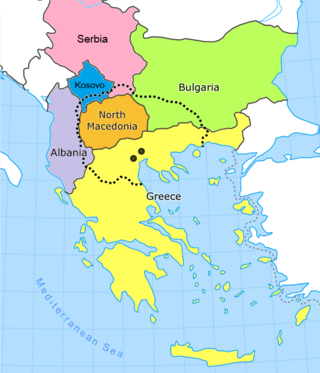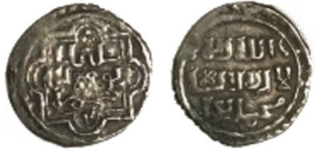Germiyan may refer to:
- Germijan, village in Pelagonia, North Macedonia
- Germiyanids, 14–15th-century dynasty in west Anatolia
- Germiyan, Azerbaijan, village in Khizi Rayon
- Garmian Region, region in Kurdistan region, Iraq
Germiyan may refer to:
Bar or BAR may refer to:
Pavlov may refer to:
Bengali or Bengalee, or Bengalese may refer to:

Macedonia most commonly refers to:

The Germiyanids was a prominent Anatolian beylik established by the Oghuz Turkish tribes after the decline of Sultanate of Rûm. However, while the beylik was always mentioned as Turkoman or Oghuz Turkish, the population consisted of Turks and Yezidi Kurds, brought by the Seljuks from the east of Malatya to western Anatolia as militia guards against the threatening Turkish tribesmen.

Kütahya is a city in western Turkey which lies on the Porsuk River, at 969 metres above sea level. It is the seat of Kütahya Province and Kütahya District. Its population is 263,863 (2022). The region of Kütahya has large areas of gentle slopes with agricultural land culminating in high mountain ridges to the north and west.

Çeşme is a municipality and district of İzmir Province, Turkey. Its area is 285 km2, and its population is 48,924 (2022). It sits at Turkey's westernmost end, on a promontory on the tip of the peninsula that also carries the same name and that extends inland to form a whole with the wider Urla-Karaburun-Çeşme Peninsula. It is a popular holiday resort and the district center, where two thirds of the district population is concentrated. Çeşme is located 85 km west of İzmir, the largest metropolitan center in Turkey's Aegean Region. There is a six-lane highway connecting the two cities. Çeşme district has two neighboring districts, Karaburun to the north and Urla to the east, both of which are also part of İzmir Province. The name "Çeşme" means "fountain" and possibly draws reference from the many Ottoman fountains that are scattered across the city.
Başmakçı is a town of Afyonkarahisar Province in the Aegean region of Turkey, closer to Denizli than to the city of Afyon itself. It is the seat of Başmakçı District. Its population is 4,993 (2021). The mayor is Halil Özcan (CHP).
Simav is a town in Kütahya Province in the Aegean region of Turkey. It is the seat of Simav District. Its population is 26,872 (2022). The town is located on the Simav River.
Gediz is a town in Kütahya Province in the Aegean region of Turkey. It is the seat of Gediz District. Its population is 26,662 (2022). The town was founded in 1970 after the old town, now called Eskigediz, was destroyed in an earthquake. The old town dates back to ancient times and was historically known as Kadoi in Greek and Gedüs in older Turkish.
Hazara may refer to:
Petrikov or Petříkov may refer to:
Germiyan is a village in the Khizi Rayon of Azerbaijan.
Yakub, Yaqub, Yaqoob, Yaqoub, Yacoub or Yakoub is a male given name. It is the Arabic version of Jacob and James. The Arabic form Ya'qūb/Ya'kūb may be direct from the Hebrew or indirectly through Syriac. The name was in use in pre-Islamic Arabia and is a common given name in Arab, Turkish, and Muslim societies. It is also used as a surname. It is common in Polish, Czech and Slovak languages, where it is transliterated as Jakub.
Qani (1898-1965) was the pen name of Muhammad Kabuli, a prominent Kurdish poet. He was born in the village of Rîshen, around Mariwan, in Iranian Kurdistan. He lost his parents shortly after his birth.
Yakub II, also known as Yakub Chelebi, was Bey of Germiyan in western Anatolia from 1387 to 1390, 1402 to 1411, and 1414 until his death. Yakub was the patron of several literary and architectural works produced during his reign.
Yakub I was the founder of the beylik of Germiyan, located in western Anatolia around Kütahya. Although Germiyan revolted against Mesud II, the Sultan of Rum, Yakub accepted vassalage under Kayqubad III. The Sultanate of Rum disintegrated shortly after. At that point, Yakub's realm extended as far east as Ankara and incorporated various towns taken from the Byzantine Empire and the Catalan Company. Yakub was the suzerain of many of his neighbors, and his reign was described as economically prosperous by contemporary historians. He was succeeded by his son Mehmed, nicknamed Chakhshadan.

Suleiman Shah, also known as Shah Chelebi, was Bey of Germiyan in western Anatolia from 1361 until his death. His reign was initially peaceful, but he was eventually involved in a conflict with the Karamanids, which forced him to seek an alliance with the Ottoman state. He arranged the marriage of his daughter Devletşah Hatun and Murad I's son and future successor, Bayezid. Although he secured an alliance with the Ottomans, Germiyan lost considerable land as Suleiman left numerous towns and smaller settlements for them to seize, including the capital Kütahya, as part of the dowry payment. Suleiman relocated to Kula and died there in 1387.
Garmian or Garmiyan is a region in the Kurdistan Region of Northern Iraq, it's historically considered to be a Kurdish province, the center of the region is located about (62 km) south of Sulaymaniyah City and (104 km) east of Kirkuk city and it includes Kalar, Kifri, Darbandikhan and Chamchamal district, and unofficially the district of Tuz Khurmatu and sometimes the district of Khanaqin. Kalar is the administrative center of the Garmiyan district. Some historic maps includes Kirkuk and Daquq to the region of Germiyan.
Yakub Beg, Yakub Bey, or Ya'qub Beg may refer to: